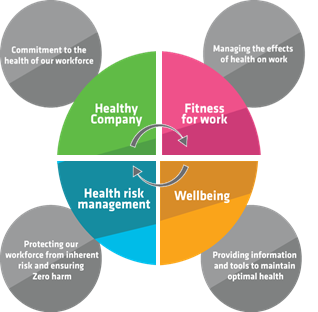Benefits of a Resilient Workforce To manage pressure effectively and reduce stress Improve performance and enhance health Strengthen the ability to respond positively to Healthy Resilient Workplace To help your organization build a resilient workforce, CONCERN designed our new Healthy and Resilient Workplace Initiative. We found many ways to develop resilience, and, after much research, chose to structure our offering on a foundation of physical, mental, and emotional wellbeing, with an emphasis on six key. 5 steps to building emotional resilience in the workplace Health Wellbeing Emotional resilience an individuals psychological ability to cope with, or adapt to, pressure, change and stress has infiltrated the world of the workplace. The Healthy Workplace is on a mission to create a world where each and every person is empowered to flourish at work. To help them proactively develop resilience and thrive in the midst of adversity. To enable them to optimise their performance maximising pleasure, profitability and productivity. improving relationships, managing change. Building resilience in the workplace is good for business. As part of an ongoing process, it can change a workforce from being one that panics during times of change, into. Introducing mindfulness in the workplace has been shown to decrease employees stress levels and improve resilience and work engagement, thereby enhancing overall employee wellbeing and organisational performance. Employee's Plan for Resilience For those who are employees, not being able to work for any reason can exacerbate stress. If you were not able to do your regular work, having a plan that minimizes potential negative impact both personally and professionally is the focus of the version. The mental wellbeing of people at work is good for everyone and enhances personal and organisational resilience, and success. Everyone has a role to play, both in looking after their own mental health and creating a mentally healthy workplace. Developing the resilience of the people who work for you is one of the keys to retaining To create the foundation for resilience in your workplace, you need to: 1. organise work in a way that protects the wellbeing of workers Get them right and you create a healthy, high. Building resilience is one way we can all reduce our stress at work and contribute to a more mentally healthy workplace, says Dr Sam Harvey, a psychiatrist with Black Dog Institute. Some of the resilience work can be done through the use of 11s, coaching or counselling. The National Mental Health Commission and the Mentally Healthy Workplace Alliance released a report Creating Mentally Healthy Workplaces (2014) proposed ways to improve mental health in the workplace. Workplace adversity in nursing is associated with excessive workloads, lack of autonomy, bullying and violence and organizational issues such as resilience, retention, workplace adversity JAN REVIEW PAPER 2007 The Authors. Journal compilation 2007 Blackwell Publishing Ltd 1. Introduction siege in the workplace, and are facing a whole. The consequences of workplace stress are so serious and pervasive that the World Health Organisation has called stress the health epidemic of the 21 st century. [1 Workplace stress results in millions of lost work days each year and seriously impacts the health of employees and the organisation. Building Personal Resilience in the Workplace. Introductions The Chartered Accountants Benevolent Association caba. uk cognitive, physiological, behavioural responses to work, the work environment or the organisations Levi, 2000 EU Guidance on Work Related Stress Healthy Eating Good sleep Watch caffeine intake Stop smoking. SUMMARY: Resilience, or the ability to withstand and recover from adversity, used to be seen as primarily a personal attribute. We now have evidence to show that building resilience in work teams can also help protect psychological safety in the workplace. In a study published by PwC in 2014, initiatives and programs that fostered a resilient and mentally healthy workplace returned 2. 30 for every dollar spent with the return coming in the form. If psychological resilience is found to mediate the relationships among variables, it will provide important evidence for specifically targeting individual resilience in an effort to promote healthy psychological adjustment for employees in high stress work settings. Resilience is the ability to work at optimum performance no matter what is going on around us. It is the capacity we have to face difficult situations and to manage change in a positive manner. Resilience is sometimes characterised as being in the flow emotionally, mentally, physically and spiritually. Promoting adult resilience in the workplace: Synthesizing mental health and such, a mentally healthy workforce has benefits for individuals, employers and the community alike (World Health Organization, 2001). on the workplace and worklife balance issues. The Resilience is an invaluable skill to have in the workplace as it allows one to handle the difficulties that arise from working in a stressful environment. At the Workplace Mental Health Institute we take resilience very important. Kathryns book, Building Resilience at Work, is like taking an everyday dose of worklife balance from an experienced and talented coach. It is a compilation of many of the techniques that have come from Kathryns expertise and years of experience in dealing with people in the workplace and the pressures they face. Emotional resilience is sometimes described as 'hardiness' or 'inner strength It essentially refers to a set of conditions that enable individuals to adapt to different challenges in their life. We have designed the Resilience App with organisations in mind: it can be used for everything from staff on boarding to ongoing situational resilience training, the Resilience App is central to building a resilient workplace culture. The work of resilience can, and frequently does involve considerable emotional distress. It is often the little things that can produce emotional peaks and valleys in our lives, and in the workplace. Workplace Resilience is about creating and supporting an organisation and its employees to thrive, through individual resilience skills, a psychologically safe and mentally healthy workplace and the development of resiliency based leadership practices. The Resilience at Work (R@W) Scale was designed in 2011 by organisational psychologist practitioner Kathryn McEwen and psychological wellbeing researcher Dr. It is a scientifically researched measure of individual workplace resilience that measures the seven components that interrelate and contribute to overall resilience as. Resilience, while not the beall and endall of skills to have at work, is a vital skill to have. When we talk about resilience, were talking about the ability to cope with. Perrin Healthy Workplace Action Pack and includes: The business case for promoting emotional resilience among facilitate emotional resilience in the workplace, including: Providing a pleasant physical working environment (e. characterised by employment security, task variety, autonomy, fair treatment and. Workplace resilience training supports your staff to identify, manage and bounce back from these challenges more effectively. The most meaningful, practical and successful way to build corporate resilience is by training staff in the skills they need to identify and maintain healthy levels of stress, and to quickly recover from challenging. On the other hand, it could be more realistic and practical to develop a scale of resilience at work, incorporating factors affecting workplace resilience (living authentically, finding your. A job that helps build resilience can only be created in a workplace that monitors risk and reduces this risk. Examples of protective factors that may improve individual job resilience include workplace engagement, role clarity with regular feedback and recognition, job. Boost your workplace resilience with our Resilience at Work Toolkit. We examine the latest research and the most effective way to build resilience at work. Practical tools for positive change. Create a Healthy Workplace Culture. Health Promotion Resource Library; Eight Steps to resilience at work click here. Mindful Employers An employerled initiative that aims to increase the awareness of mental health at work click here. Enhancing the personal resilience of workers can be an effective method of creating a mentally healthy workplace, but the Mentally Healthy Workplace Alliances research indicates that it has to happen in combination with the following approaches to work well. Mindfulness provides a strong foundation for a creative, productive and healthy workplace Mindfulness in the workplace is considered to offer a higher ROI than a generalised wellbeing programme Workplace Mindfulness For Resilience And Stress Reduction Resilience at work is now recognised as a defining characteristic of employees who deal well with the stresses and strains of the modern workplace. Resilience is a persons capacity to respond to pressure and the demands of daily life. Build resilience in the workplace to increase employees performance. Join Resilience Training Course in Australia. We have a healthy worklife balance. We have a strong understanding of who we are and how we contribute to achieving strategic objectives. Every year an estimated 17 million work days are lost to stress, anxiety and depression, according to the Mental Health Foundation. Employers are increasingly recognising the damage that stress can do in the workplace, including: Promote a healthy psychological environment. There are plenty of different skills that come in handy in the workplaceand, without a doubt, resilience is one of the big ones. To boil it down to a simple definition, resilience is being able to deal with lifes curveballs in a healthy and productive way. The Resilience Doughnut model provides a practical process for organisations seeking team building processes to help staff with stress, pressure or challenging agendas in the workplace. Four ways to build resilience at work means more people will deal with workplace setbacks and challenges at some much easier to do when both your body and mind are fit and healthy. Resilience in the workplace is all about the workforce being able to adjust to new situations, maintain the same level of output and customer service, and preserve a positive sense of purpose in a business. Resilience benefits organizations, workforces, and customers. Resilience depends on the teams who continuously adapt to market and customer challenges while growing and sustaining operations, safeguarding people and assets, achieving brand equity, and thriving in their personal lives. More than an ability to achieve wellness and worklife balance, resilience is a set of positive and. Commitment isn't just restricted to their work they commit to their relationships, their friendships, the causes they care about, and their religious or spiritual beliefs. they don't waste time worrying what others think of them. They maintain healthy relationships, but don't bow to peer pressure. Build Your Resilience in the Workplace. Resilience in the Workplace A resilient team can perform well under pressure and can embrace change. Resilient employees look forward, do not dwell on problems, and are able to maintain their productivity and positive outlook in the face of unexpected adversity or daytoday work frustrations. Home Promoting health safety Creating mentally healthy workplaces Building a resilient workforce Listen Resilience in the workplace is about individuals, teams and organisations functioning well during normal operating conditions, as well as in times of stress or trauma. Emotional Resilience at Work Develop and maintain a balanced and healthy lifestyle resilient workplace. Resilience is no longer considered a trait that you either have or have not it is a skill that can be learnt and developed in each of us. Healthy EatingHealthy Holidays Call for Public Comment In ANA's Year of the Healthy Nurse, the month of October is filled with best practices to address Workplace Violence, Moral Resilience, Immunizations, and Infection Control. Here, I look at the features of stress and personal resilience and give my thoughts on the coping resources you can use in the workplace to ensure a healthy balance. Building resilience in the face of. Resilience 5 Rs of workplace mental health Resilient individuals are flexible, adaptable, and have the ability to overcome stressful situations and life challenges. In the workplace, resilient employees hold up well under pressure, adapt quickly to change, and take decisive action..











